Filter by

The Unknown as an Engine for Science An Essay on the Definite and the Indefi…
This book explores the limits of our knowledge. The author shows how uncertainty and indefiniteness not only define the borders confining our understanding, but how they feed into the process of discovery and help to push back these borders. Starting with physics the author collects examples from economics, neurophysiology, history, ecology and philosophy. The first part shows how informatio…
- Edition
- -
- ISBN/ISSN
- 978-3-319-18509-5
- Collation
- -
- Series Title
- -
- Call Number
- -

The Tagore-Gandhi Debate on Matters of Truth and Untruth
Between 1915 and 1941, Tagore (1861-1941) and Gandhi (1869-1948) differed and argued about many things of personal, national, and international significance---satyagraha, non-cooperation, the boycott and burning of foreign cloth, the efficacy of fasting as a means of resistance and Gandhi’s mantra connecting “swaraj” and “charkha”. The author tracks the development of this dialogue an…
- Edition
- -
- ISBN/ISSN
- 978-81-322-2116-6
- Collation
- -
- Series Title
- -
- Call Number
- -

The Shaping of Ambient Intelligence and the Internet of Things
Recent advances in ICT have given rise to new socially disruptive technologies: AmI and the IoT, marking a major technological change which may lead to a drastic transformation of the technological ecosystem in all its complexity, as well as to a major alteration in technology use and thus daily living. Yet no work has systematically explored AmI and the IoT as advances in science and technolog…
- Edition
- -
- ISBN/ISSN
- 978-94-6239-142-0
- Collation
- -
- Series Title
- -
- Call Number
- -
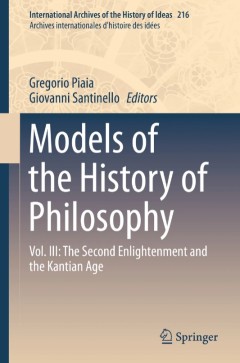
Models of the History of Philosophy:Vol. III: The Second Enlightenment and th…
This is the third volume of Models of the History of Philosophy, a collaborative work on the history of the history of philosophy dating from the Renaissance to the end of the nineteenth century. The volume covers a decisive period in the history of modern thought, from Voltaire and the great “Encyclopédie” of Diderot and d'Alembert to the age of Kant, i.e. from the histoire de l'esprit hu…
- Edition
- 1
- ISBN/ISSN
- 978-94-017-9965-2
- Collation
- XXXII, 1000
- Series Title
- International Archives of the History of Ideas Archives internationales d'histoire des idées
- Call Number
- -

The Sense of Things
This book proposes a new interpretative key for reading and overcoming the binary of idealism and realism. It takes as its central issue for exploration the way in which human consciousness unfolds, i.e., through the relationship between the I and the world—a field of phenomenological investigation that cannot and must not remain closed within the limits of its own disciplinary borders. The b…
- Edition
- -
- ISBN/ISSN
- 978-3-319-15395-7
- Collation
- -
- Series Title
- -
- Call Number
- -
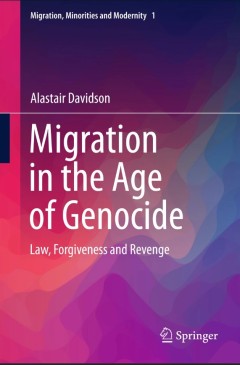
Migration in the Age of Genocide
This book presents a novel proposal for establishing justice and social harmony in the aftermath of genocide. It argues that justice should be determined by the victims of genocide rather than a detached legal system, since such a form of justice is more consistent with a socially grounded ethics, with a democracy that privileges citizen decision-making, and with human rights. The book covers …
- Edition
- 1
- ISBN/ISSN
- 978-3-319-21848-9
- Collation
- XIV, 216
- Series Title
- Migration, Minorities and Modernity
- Call Number
- -
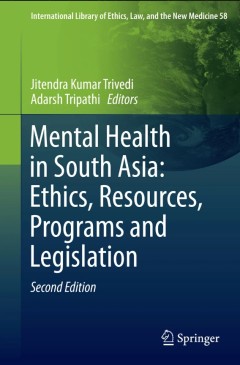
Mental Health in South Asia: Ethics, Resources, Programs and Legislation
Asia is by far the largest continent in the world in terms of area with population exceeding 3.5 billion and has dozens of cultures, religions, languages and ethnic groups. As a result of its highly varied political systems, Asia also spawns a wide variety of health care systems including mental health care systems, often based on historical roots and at times colonial heritages. The people who…
- Edition
- 1
- ISBN/ISSN
- 978-94-017-9016-1
- Collation
- XV, 363
- Series Title
- International Library of Ethics, Law, and the New Medicine
- Call Number
- -

The Role of Technology in Science: Philosophical Perspectives
This edited volume explores the interplay between philosophies in a wide-ranging analysis of how technological applications in science inform our systems of thought. Beginning with a historical background, the volume moves on to explore a host of topics, such as the uses of technology in scientific observations and experiments, the salient relationship between technology and mechanistic notions…
- Edition
- -
- ISBN/ISSN
- 978-94-017-9762-7
- Collation
- -
- Series Title
- -
- Call Number
- -
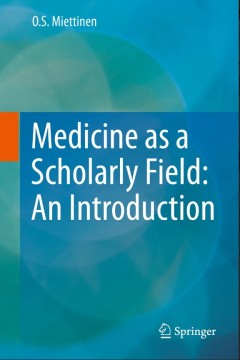
Medicine as a Scholarly Field: An Introduction
To me it is astonishing and to medicine actually shameful that it has taken up to year 2015 before there is a work in which the essence of medicine is described and discussed." -- J. Steurer, University of Zurich "[In this book], Miettinen beautifully elucidates the concepts and principles of knowledge-based diagnosis, and prognosis, within medicine. Now, after six decades of keen ob…
- Edition
- 1
- ISBN/ISSN
- 978-3-319-19011-2
- Collation
- XVI, 136
- Series Title
- Medicine as a Scholarly Field: An Introduction
- Call Number
- -
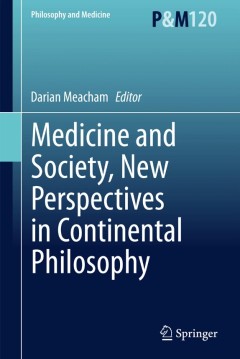
Medicine and Society, New Perspectives in Continental Philosophy
This volume addresses some of the most prominent questions in contemporary bioethics and philosophy of medicine: ‘liberal’ eugenics, enhancement, the normal and the pathological, the classification of mental illness, the relation between genetics, disease and the political sphere, the experience of illness and disability, and the sense of the subject of bioethical inquiry itself. All of the…
- Edition
- 1
- ISBN/ISSN
- 978-94-017-9869-3
- Collation
- VIII, 323
- Series Title
- Philosophy and Medicine
- Call Number
- -
 Computer Science, Information & General Works
Computer Science, Information & General Works  Philosophy & Psychology
Philosophy & Psychology  Religion
Religion  Social Sciences
Social Sciences  Language
Language  Pure Science
Pure Science  Applied Sciences
Applied Sciences  Art & Recreation
Art & Recreation  Literature
Literature  History & Geography
History & Geography